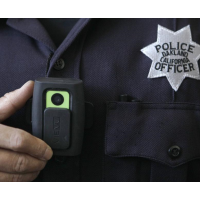Will L.A. Cops Turn Their Body Cameras On? They Didn’t in Oakland
 (photo: Jeff Chiu, Associated Press)
(photo: Jeff Chiu, Associated Press)
Los Angeles police plan to protect and serve the community next year while recording them with body cameras, joining a legion of law enforcement agencies across the country that are experimenting with the technology.
The decision, announced Tuesday by L.A. Mayor Eric Garcetti, comes amid animated discussion over conflicting visual testimony in the Ferguson, Missouri, police shooting of Michael Brown. Garcetti said “cameras are not a panacea,” which was painfully obvious to anyone who saw the videotape of New York police choking to death a pleading Eric Garner.
But there is growing statistical evidence that their presence induces better police behavior and fewer physical encounters.
By virtue of its size, L.A. becomes the largest U.S. city to adopt a body-camera policy, and the Los Angeles Times says its decision to put them on 7,000 of its 9,900 officers would be the largest deployment.
There are, however, potential pitfalls and Ars Technica brought one to light this week. Oakland police have been disciplined 24 times over the past two years for not turning their cameras on. Oakland has around 450 cameras for its 660-member force and they are supposed to strap on when making arrests, serving warrants and during other potentially contentious encounters. Selective use of cameras by police would be problematic.
Body cameras on cops is trending. At a time when police departments are coming under scrutiny for their hearty acquisition of military equipment and adoption of military tactics, body cameras are getting good press for providing a potential check on police misbehavior.
President Obama likes them.
L.A. police want to start shooting with cameras early next year. Although the plan is being embraced by most interested parties, there are still some unsettled issues. For instance, the police union wants to let officers review the videos before filing their report. They say it is for the sake of accuracy, but critics contend it would be used to shape reports in misleading ways.
“It's the difference between this being a tool to promote accountability and this being a tool to assist in cover-ups,” ACLU attorney Peter Bibring told the LA Weekly.
That’s not Bibring’s only concern. In August 2013, he told the New York Times he was generally enthusiastic about the potential of cameras, but cautioned that certain privacy concerns had to be addressed. The recording shouldn’t be stored for long periods of time, except when misconduct is alleged. And some of the video should not be released to the public.
Those privacy concerns are part of a larger recognition that authorities are increasingly using cameras to track people without their knowledge. That has drawn the attention of civil liberties advocates who aren’t fond of the authorities recording activities of people not suspected of wrongdoing and storing the data for indefinite periods of time, often without their knowledge, much less consent.
Cameras are showing up on street corners and states are considering imbedding trackers in digital license plates. Police also use license plate scanners to profile drivers through storage of their GPS movement. These data sources are being networked and information is being packaged and repurposed out of public view.
Police body cameras will make a fine addition to this ever-expanding resource and perhaps liven up the 24-hour news cycle.
–Ken Broder
To Learn More:
Oakland Cops Disciplined 24 Times for Failing to Turn on Body-Worn Cameras (by Cyrus Farivar, Ars Technica)
L.A. Mayor Plans 7,000 Police Body Cameras in 2015 (by Tami Abdollah, Associated Press)
Will LAPD Cops Get to Watch Body Camera Video Before Writing Their Reports? (by Gene Maddaus, LA Weekly)
LAPD's Plan for 7,000 Body Cameras Comes with Challenges (by Kate Mather and Richard Winton, Los Angeles Times)
Complaints and Use of Force Drop after Rialto Police Don Tiny Video Cameras (by Ken Broder, AllGov California)
Self-Awareness to Being Watched and Socially-Desirable Behavior: A Field Experiment on the Effect of Body-Worn Cameras on Police Use-of-Force (by Barak Ariel and William Farrar) (pdf)
- Top Stories
- Controversies
- Where is the Money Going?
- California and the Nation
- Appointments and Resignations
- Unusual News
- Latest News
- California Forbids U.S. Immigration Agents from Pretending to be Police
- California Lawmakers Urged to Strip “Self-Dealing” Tax Board of Its Duties
- Big Oil’s Grip on California
- Santa Cruz Police See Homeland Security Betrayal in Use of Gang Roundup as Cover for Immigration Raid
- Oil Companies Face Deadline to Stop Polluting California Groundwater





